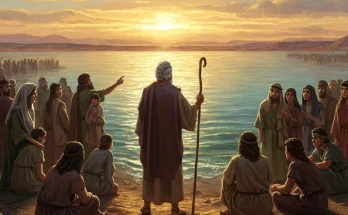- Writer of the Book of Ruth
- Date Written
- To Whom Written
- Purpose of the Book of Ruth
- Historical Context of the Book of Ruth
- Key Themes in the Book of Ruth
- Major Events/Stories in the Book of Ruth
- Theological Contributions in the Book of Ruth
- Special Consideration in the Book of Ruth
- Book of Ruth: Final Insights
- Frequently Asked Questions (FAQ) About the Book of Ruth
In the Book of Ruth, we find an inspiring story of loyalty, faith, and God’s hand at work in everyday lives. Ruth, a Moabite widow, chooses to stay with her mother-in-law, Naomi, showing remarkable love and devotion. Together, they face hardship but find hope through God’s provision. Ruth’s journey doesn’t just reflect faith and friendship; it highlights God’s plan to include all people in His promise.
What’s amazing is how Ruth’s story fits into the bigger picture. Her marriage to Boaz leads to the birth of Obed, the grandfather of King David. Through this lineage, Jesus Himself would come into the world. The Book of Ruth reminds us that God can use anyone, even those society sees as outsiders, to accomplish His purposes. As we explore this story, let’s keep an eye on how faith and friendship bring Ruth and Naomi from sorrow to joy, showing us God’s love and loyalty in action.
Writer of the Book of Ruth
The Book of Ruth does not name its author, though it is traditionally attributed to the prophet Samuel. Scholars, however, debate this attribution, as there’s no solid evidence confirming Samuel as the writer. Some believe Samuel wrote it to provide historical context for King David’s ancestry, as Ruth becomes David’s great-grandmother.
The lack of a clear author makes the Book of Ruth unique. Because we don’t know who wrote it, we’re left to focus on its message rather than a specific writer’s perspective. This anonymity invites us to approach the text with fresh eyes, paying close attention to the characters and themes.
This uncertainty about authorship also reminds us that God can use any voice, known or unknown, to reveal His truth. The Book of Ruth shows us that the story’s impact doesn’t depend on knowing who wrote it. Instead, its powerful lessons on loyalty, faith, and redemption stand on their own, speaking to readers throughout history.
Date Written
The Book of Ruth was likely written during Israel’s monarchy, around 1010–970 BC, possibly during King David’s reign. Many scholars believe it was composed to emphasize David’s heritage, as Ruth is his great-grandmother. This connection to David helps to root his lineage in themes of faith and loyalty, showing that even a Moabite woman like Ruth could play a vital role in God’s plan for Israel.
This dating suggests that the Book of Ruth served as a reminder of Israel’s humble beginnings and God’s faithfulness in preserving His people. During David’s reign, Israel was united and powerful, but they still needed to remember their dependence on God and their covenant history. Ruth’s story likely inspired them to remain faithful, emphasizing that God can work through any person or situation.
The timing also connects Ruth’s loyalty to Israel’s ongoing relationship with God. Ruth’s story reminds Israel of God’s redeeming love and the value of including “outsiders” in His covenant. This message would have resonated deeply, encouraging Israel to maintain unity and faithfulness under David’s kingship.
To Whom Written
The Book of Ruth was primarily written for the people of Israel. It highlights God’s faithfulness to His covenant people and emphasizes that His plan extends beyond Israel to include Gentiles. Through Ruth, a Moabite, we see how God’s love and redemption can reach anyone willing to trust in Him. Ruth’s inclusion in Israel’s story shows that God values faith and loyalty, regardless of someone’s nationality or background.
For the Israelites, Ruth’s story reminded them of their own journey with God and His unwavering commitment to those who follow Him. It also encouraged them to be open-hearted, recognizing that God could bring people from any background into His family. This was especially meaningful at a time when Israel might have been focused on ethnic and cultural distinctions.
Today, readers from all backgrounds can find value in the Book of Ruth. Its themes of redemption, loyalty, and God’s providence are universal. Ruth’s story reminds us that faith and kindness can bridge any divide, and that God often works through unlikely people. The Book of Ruth invites us all to see ourselves as part of God’s redemptive plan, no matter where we come from.
Purpose of the Book of Ruth
The Book of Ruth serves multiple purposes, all centered on showing God’s faithfulness and provision even in the most challenging times. Ruth, a Moabite widow, chooses to stay with her mother-in-law, Naomi, in a show of deep loyalty and love. Through Ruth’s journey, we see that God cares for His people, guiding them even in hardship.
Another purpose of the Book of Ruth is to emphasize the inclusion of Gentiles in God’s plan. Ruth, though not an Israelite, becomes part of Israel’s story and is honored in the lineage of King David and, ultimately, Jesus. Her inclusion highlights that God’s promise is for all people, not just Israel, showing the beauty of God’s grace.
The book also stresses the importance of family bonds, kindness, and loyalty. Ruth’s loyalty to Naomi, Boaz’s kindness to Ruth, and God’s care for all three illustrate the strength of godly love. This love extends beyond cultural and social boundaries, teaching us that faithfulness and love can bring redemption. The Book of Ruth is a timeless reminder that God’s plan often unfolds through relationships, faith, and love.
Historical Context of the Book of Ruth
The Book of Ruth is set during the time of the Judges, a period marked by moral chaos and instability in Israel. The Israelites frequently strayed from God’s commandments, leading to cycles of oppression, deliverance, and repeated failures. This turbulent backdrop contrasts sharply with Ruth’s story, which centers on loyalty, faith, and God’s quiet guidance.
Ruth’s story also unfolds amid cultural tensions between the Israelites and Moabites. As a Moabite, Ruth would have been viewed with suspicion and perhaps hostility by Israelites. Moabites were traditionally seen as enemies of Israel, yet Ruth’s faith and loyalty to Naomi, an Israelite, break through these cultural barriers. Her devotion, along with Boaz’s willingness to redeem her, highlights God’s welcoming of all who seek Him.
The Book of Ruth thus offers a powerful reminder of God’s faithfulness in turbulent times. Despite Israel’s struggles, God was still working through individuals like Ruth to bring about His purpose. In this context, Ruth’s story becomes a beacon of hope, showing how faith can overcome even the deepest divides.
Key Themes in the Book of Ruth
One of the most profound themes in the Book of Ruth is loyalty. Ruth’s devotion to her mother-in-law, Naomi, goes beyond social expectations. Despite being free to return to her own people after her husband’s death, Ruth chooses to stay with Naomi, saying, “Where you go, I will go, and where you stay, I will stay.” This unwavering loyalty reflects Ruth’s deep character and her commitment to both family and faith. Through Ruth’s actions, we see a model of selfless devotion that inspires us to show steadfast love in our relationships. Additionally, Ruth’s faith in Naomi’s God marks her as a person of remarkable spiritual integrity, one willing to embrace a new identity.
Redemption
Redemption is central to the Book of Ruth. Boaz acts as a “kinsman-redeemer” by marrying Ruth, preserving her deceased husband’s family line. His role as a redeemer is not only significant to Ruth’s immediate situation but also symbolically foreshadows Jesus’ redemptive role for humanity. Just as Boaz restores Ruth’s life and legacy, Jesus redeems us, offering new life and eternal hope. Boaz’s kindness and willingness to fulfill this duty highlight the importance of mercy and grace in God’s plan.
Providence
In the Book of Ruth, we also witness the theme of God’s providence. While God’s presence isn’t overtly highlighted, His hand guides every event, from Ruth’s arrival in Boaz’s field to Boaz’s acceptance of his role as redeemer. These “coincidences” show us that God orchestrates our lives, even in ordinary details. Ruth’s journey is filled with moments where God’s guidance is evident, encouraging us to trust that He works behind the scenes, especially during difficult times. God’s quiet, yet active, providence assures us that He sees and cares for us, even when life seems uncertain.
Inclusion of Outsiders
Ruth’s identity as a Moabite emphasizes another theme: the inclusion of outsiders in God’s plan. Despite cultural prejudices, Ruth’s faith and loyalty earn her a place within Israel, and she ultimately becomes an ancestor of David and Jesus. This theme of inclusion underscores that God’s love is available to all people, regardless of their background. Ruth’s acceptance into Israel’s lineage reveals God’s desire for a diverse family, unified by faith.
Through loyalty, redemption, providence, and inclusion, the Book of Ruth presents timeless truths about God’s love and purpose. It reminds us that God values faith and character over cultural identity and that He actively works to redeem and include all who seek Him.
Major Events/Stories in the Book of Ruth
One of the most significant moments in the Book of Ruth occurs when Ruth decides to stay with Naomi after the death of her husband. Both widowed and facing uncertain futures, Naomi urges her daughters-in-law to return to their families in Moab. However, Ruth, in a remarkable act of loyalty and love, refuses to leave Naomi, famously declaring, “Where you go, I will go… Your people will be my people and your God my God.” Ruth’s commitment to Naomi demonstrates profound loyalty and faith, setting the foundation for the rest of the story. This act of selflessness also marks Ruth as a woman of integrity and devotion, qualities that guide her throughout the narrative.
Ruth Gleans in Boaz’s Field
Upon arriving in Bethlehem, Ruth takes on the humble task of gleaning in nearby fields to provide for herself and Naomi. In a twist of providence, she ends up in the field of Boaz, a close relative of Naomi’s deceased husband. Boaz, known for his kindness and respect, shows Ruth favor by allowing her to glean safely and providing extra grain. This introduction to Boaz not only ensures Ruth and Naomi’s survival but also sets the stage for Boaz’s role as Ruth’s potential redeemer. His kindness reflects his godly character and hints at the deeper relationship that will develop between him and Ruth.
Ruth and Boaz at the Threshing Floor
The encounter at the threshing floor is a pivotal moment in the Book of Ruth. Naomi advises Ruth to approach Boaz at night and request his protection as a redeemer. By doing so, Ruth courageously seeks Boaz’s help to redeem her and preserve her family’s legacy. This moment is culturally bold, as Ruth openly asks for Boaz’s protection under God’s laws of redemption. Boaz, moved by Ruth’s loyalty and integrity, agrees, but notes that a closer relative has the first right of redemption. Ruth’s request and Boaz’s response highlight both their courage and commitment to God’s law.
Boaz Marries Ruth
The story reaches its conclusion when Boaz marries Ruth after clearing the matter with the nearer relative, who declines the role of redeemer. By marrying Ruth, Boaz not only redeems her but also secures the family’s inheritance and lineage. Their union results in the birth of Obed, who becomes the grandfather of King David, firmly establishing Ruth’s place in Israel’s history. Boaz’s actions as redeemer reflect God’s redemptive nature and foreshadow the ultimate redemption through Jesus.
Through these major events, the Book of Ruth unfolds as a story of loyalty, providence, and redemption, highlighting God’s faithfulness and the power of love and devotion.
Theological Contributions in the Book of Ruth
The Book of Ruth offers rich theological insights that deepen our understanding of God’s character and plan. Central to the book is the concept of the kinsman-redeemer, seen in Boaz’s role. Boaz steps in to redeem Ruth, restoring her family’s line and inheritance. His actions prefigure Christ’s redemptive work for humanity, where Jesus, like Boaz, redeems and restores us, taking on our burdens and giving us new life.
Another significant theme is God’s sovereignty in daily life. The events in Ruth’s story may seem ordinary, yet God’s guiding hand is evident throughout. From Ruth’s arrival in Boaz’s field to Boaz’s willingness to fulfill his duty as redeemer, we see God orchestrating events to fulfill His purposes. This reminds us that God works even in the seemingly small details of our lives.
The Book of Ruth also emphasizes covenant faithfulness. Ruth’s loyalty to Naomi and Boaz’s commitment to redeeming Ruth illustrate the blessings that come from honoring God’s covenant. Through this story, we see that God rewards faithfulness and that His promises endure. Together, these theological contributions reveal a God who is both deeply personal and faithful, always working to redeem and restore.
Special Consideration in the Book of Ruth
The Book of Ruth presents unique considerations that deepen its message of inclusion and redemption. Ruth, a Moabite widow, enters the Israelite community despite cultural and ethnic barriers. As a Moabite, she would have been viewed as an outsider, yet her faithfulness to Naomi and commitment to Israel’s God lead to her full acceptance. This inclusion highlights God’s love for all people, regardless of background, and foreshadows the New Testament message that God’s salvation is open to all.
Boaz, too, plays a significant role as a Christ-like figure, embodying qualities of compassion, protection, and redemption. By choosing to redeem Ruth and restore her family’s legacy, Boaz mirrors the sacrificial love Christ would later show humanity. His actions illustrate God’s willingness to intervene for those in need and provide a future.
Ruth’s faith impacts future generations, establishing her as the great-grandmother of King David and part of Jesus’ lineage. Her story reminds us that God’s purpose often unfolds through ordinary people whose faithfulness creates lasting impact across generations.
Book of Ruth: Final Insights
The Book of Ruth is a timeless story of loyalty, love, and divine redemption. Ruth’s devotion to Naomi, Boaz’s kindness as a redeemer, and God’s unseen guidance illustrate the beauty of faith and trust. Ruth’s journey from a Moabite widow to a beloved member of Israel reflects God’s ability to bring outsiders into His family, showing that His love knows no boundaries.
This story also reminds us of God’s providence, as He works through ordinary lives to fulfill His greater purposes. Boaz’s role as a redeemer points us to Christ, who redeems and restores us with the same compassionate love.
Today, the Book of Ruth continues to inspire, encouraging us to stay loyal, trust in God’s timing, and recognize His hand in our lives. Ruth’s example teaches us that faithfulness and love can bring unexpected blessings, and that God always honors those who seek Him. Her story assures us that, no matter our background, we are valued in God’s plan.
Frequently Asked Questions (FAQ) About the Book of Ruth
1. What is the main message of the Book of Ruth? The Book of Ruth emphasizes themes of loyalty, faith, and God’s provision. It shows how God can use anyone, even outsiders, to fulfill His plans.
2. Why is Ruth’s background as a Moabite important? Ruth’s Moabite heritage highlights God’s inclusive love. Despite being a foreigner, she is accepted and becomes part of Israel’s history, showing God’s care for all nations.
3. Who is Boaz, and what is his role in the Book of Ruth? Boaz is a close relative of Naomi’s family and acts as a “kinsman-redeemer.” He marries Ruth, redeeming her family line and foreshadowing Christ’s redemptive role.
4. How does the Book of Ruth connect to Jesus’ lineage? Ruth and Boaz’s son, Obed, becomes the grandfather of King David, linking Ruth’s story to the lineage of Jesus and emphasizing God’s sovereign plan.
5. What lessons can we learn from the Book of Ruth today? The Book of Ruth teaches us the importance of loyalty, kindness, and faith, reminding us to trust God’s provision even in hard times.





